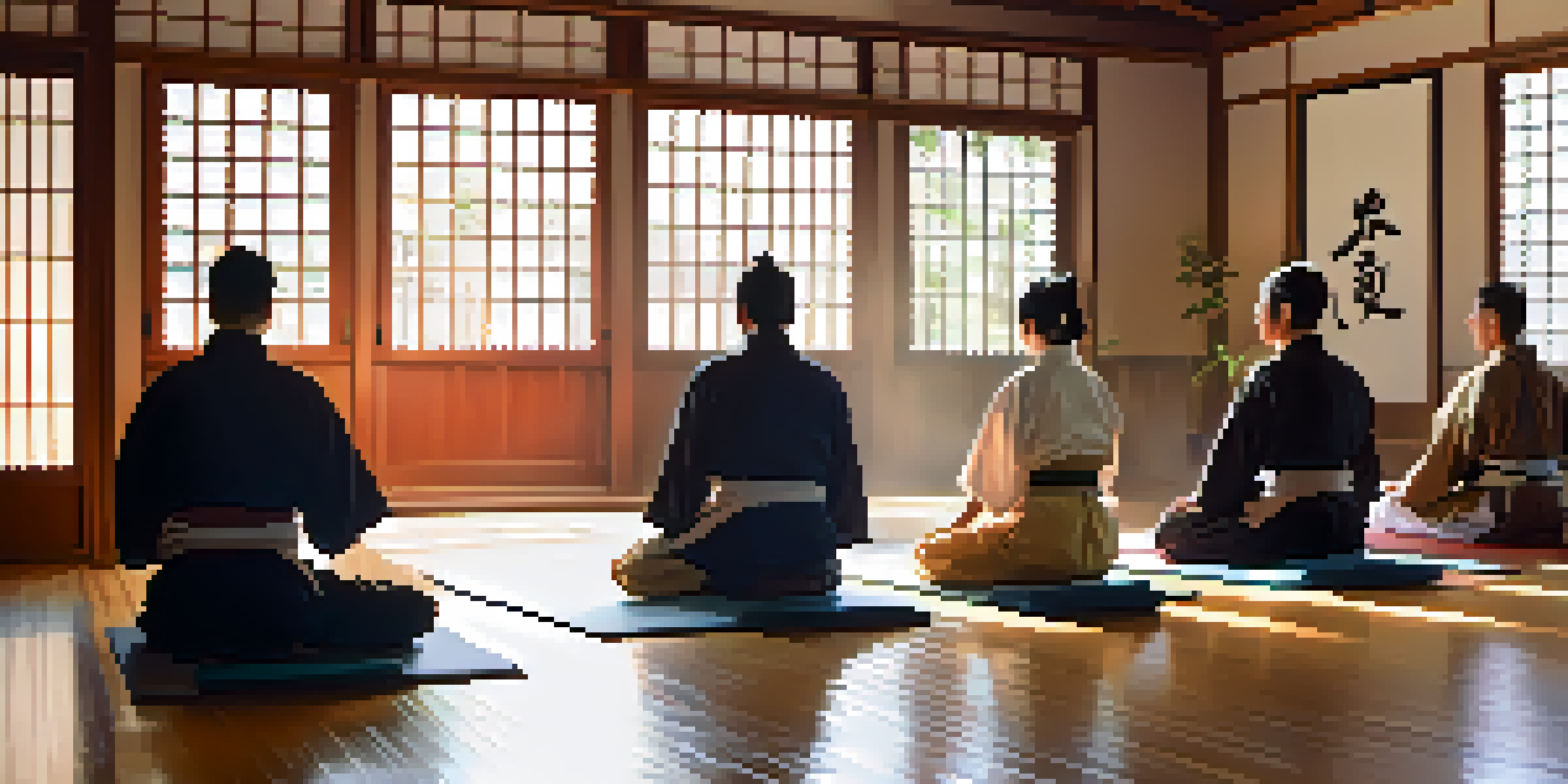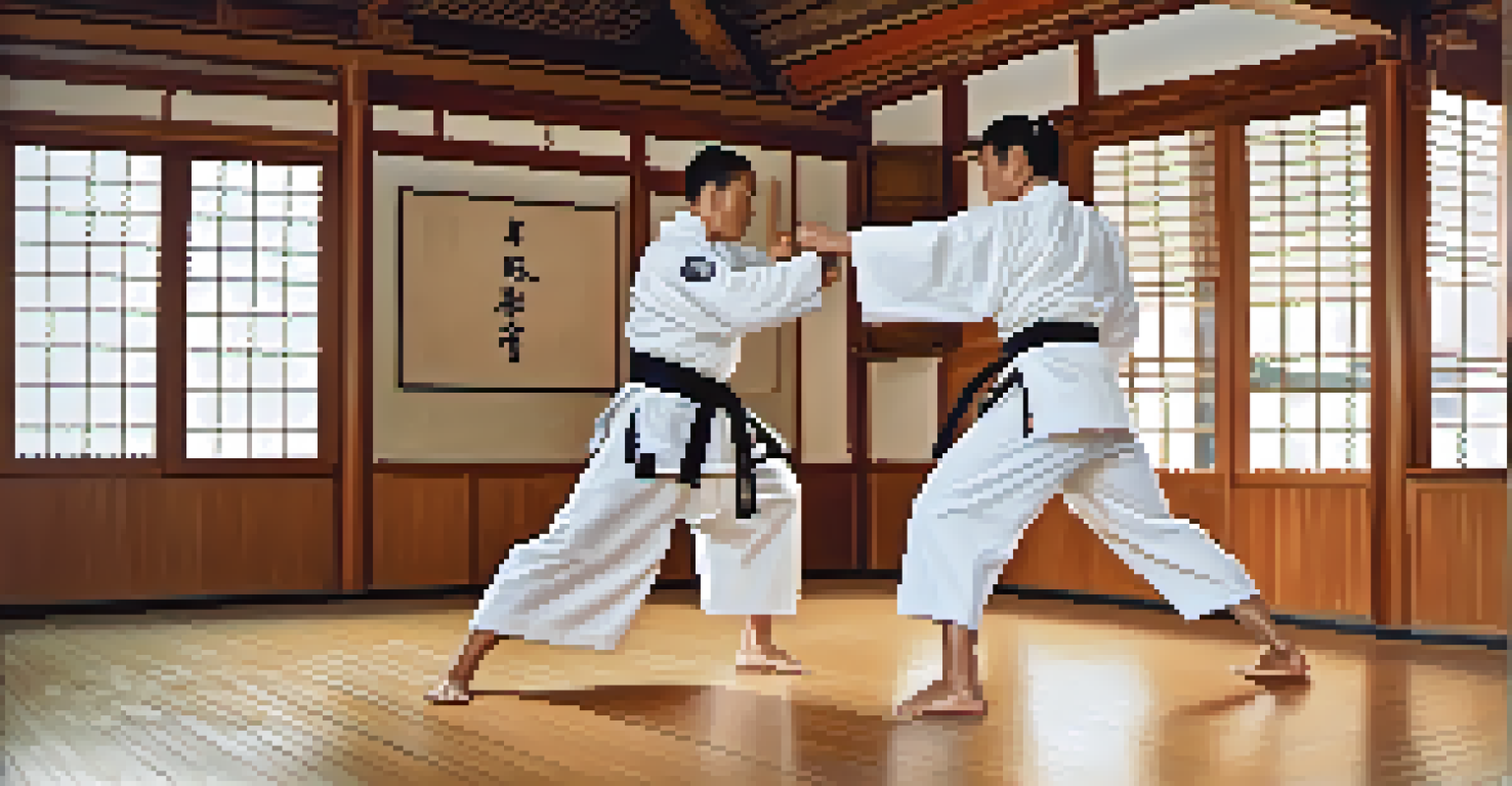From the Dojo to Daily Life: Conflict Resolution Skills

Understanding Conflict: A Martial Arts Perspective
In martial arts, conflict is not just about physical confrontations; it's a profound understanding of human interaction. Every dojo teaches that conflict often arises from misunderstandings or differing perspectives, much like a sparring match where each opponent has a unique style. By recognizing the root of conflict, we can approach resolution with a clear mind and an open heart, essential in both martial arts and daily life.
In the midst of movement and chaos, keep stillness inside of you.
As practitioners learn to read their opponent's movements, they also learn to anticipate responses. This skill translates to daily interactions, making us more adept at navigating conversations that could escalate into conflict. By observing body language and tone, we can often sense when tensions are rising, allowing us to intervene before situations escalate.
Ultimately, understanding conflict in the dojo prepares us for the complexities of life outside its walls. Just as we learn to control our physical reactions during training, we must also cultivate emotional intelligence to handle disputes effectively. This foundation sets the stage for developing practical conflict resolution skills.
The Importance of Active Listening in Conflict Resolution
One of the core principles in martial arts is to be aware of your surroundings, which includes listening to your opponent. Active listening is a vital skill that enables us to fully understand another person's perspective before responding. In a conflict, this means giving our full attention to the speaker, nodding, and asking clarifying questions to ensure comprehension.

When we practice active listening, we show respect and validation for the other person's feelings. This simple act can diffuse tension and create a more conducive environment for resolution. Think of it as a martial artist taking a moment to assess their opponent's stance before making a move—it's about strategic communication.
Understanding Conflict's Roots
Recognizing the underlying causes of conflict enhances our ability to resolve disputes thoughtfully.
Moreover, when both parties engage in active listening, it fosters a collaborative atmosphere. This mutual respect can turn a heated disagreement into a constructive dialogue, much like two martial artists learning from each other's techniques. In essence, active listening equips us with the tools to find common ground.
Emotional Regulation: Staying Calm Under Pressure
In the heat of conflict, emotions can run high, clouding our judgment and escalating tensions. Martial arts training emphasizes the importance of emotional regulation—staying calm and composed even when faced with adversity. This practice is essential in daily life as well, where maintaining a cool demeanor can prevent conflicts from spiraling out of control.
The greatest victory is that which requires no battle.
Techniques like deep breathing and mindfulness, often taught in dojos, can be invaluable tools for emotional regulation. By taking a moment to breathe and collect our thoughts, we can respond thoughtfully instead of reacting impulsively. This pause can be the difference between a calm resolution and a heated blow-up.
Ultimately, mastering emotional regulation empowers us to approach conflicts with a clear mind. Just as a martial artist must control their body, we must learn to control our emotions—this balance leads to more effective conflict resolution in all areas of life.
Finding Common Ground: The Key to Resolution
In martial arts, practitioners often find common ground through shared values, such as respect and discipline. Similarly, in conflict resolution, identifying shared interests can bridge the gap between opposing sides. By focusing on what we have in common, we build a foundation for collaboration rather than confrontation.
For instance, in a workplace disagreement, understanding that both parties desire a successful outcome can shift the focus from winning to problem-solving. This mindset encourages cooperation, making it easier to brainstorm solutions that satisfy everyone involved. It’s like two martial artists coming together to train, each bringing their strengths to enhance the experience.
Active Listening's Key Role
Practicing active listening fosters respect and collaboration, transforming conflicts into constructive dialogues.
Finding common ground is not just about compromise; it's about creating a win-win scenario. When we approach conflicts with a collaborative spirit, we foster relationships that are not only resilient but also enriched by mutual understanding. This principle is as vital in the dojo as it is in our daily interactions.
The Role of Empathy in Conflict Resolution
Empathy is a powerful tool in martial arts, allowing practitioners to connect with their opponents on a deeper level. By putting ourselves in someone else's shoes, we can better understand their motivations and emotions during a conflict. This understanding is crucial for resolving disputes, as it helps us respond with compassion rather than hostility.
When we practice empathy, we acknowledge the other person's feelings, which can be incredibly disarming. Similar to how a martial artist may choose to yield to an opponent's strength instead of clashing directly, we can choose to validate feelings instead of dismissing them. This approach often leads to a more open and honest dialogue.
Ultimately, empathy transforms conflict from a battleground into a space for growth and understanding. By fostering empathy in our interactions, we not only resolve conflicts but also strengthen our relationships, paving the way for a more harmonious life.
Negotiation Skills: The Art of Compromise
Just as martial artists learn to negotiate their way through a sparring match, we must develop negotiation skills to resolve conflicts effectively. Negotiation is not about winning or losing; it's about finding a solution that satisfies all parties involved. This skill is essential in everyday life, from navigating workplace disagreements to personal relationships.
Effective negotiation involves clear communication, understanding each party's needs, and being willing to compromise. It's similar to two martial artists adjusting their techniques to find a rhythm that works for both. By entering negotiations with an open mind, we create an environment where everyone feels heard and valued.
Emotional Regulation Matters
Mastering emotional regulation empowers individuals to approach conflicts calmly, leading to more effective resolutions.
Practicing negotiation skills can lead to more constructive outcomes, allowing us to maintain relationships while addressing conflicts. Ultimately, the art of compromise is about collaboration, ensuring that all voices are respected in the resolution process. This principle echoes the camaraderie found within the dojo.
Reflecting on Conflicts: Learning and Growth
In martial arts, reflection is key to improvement; each sparring session is an opportunity to learn. Similarly, reflecting on conflicts allows us to identify patterns and areas for growth in our communication and conflict resolution strategies. By taking the time to analyze past disputes, we can develop a deeper understanding of our responses and triggers.
This process of reflection can be as simple as journaling about a recent conflict or discussing it with a trusted friend. By examining what worked and what didn't, we can refine our approach for future interactions, much like a martial artist perfecting their technique. This continuous improvement mindset is essential for personal growth.

Ultimately, viewing conflicts as learning experiences fosters resilience and adaptability. Instead of fearing conflict, we can embrace it as an opportunity for growth, both in our personal lives and within our relationships. This perspective encourages us to approach future conflicts with a sense of curiosity and readiness to learn.